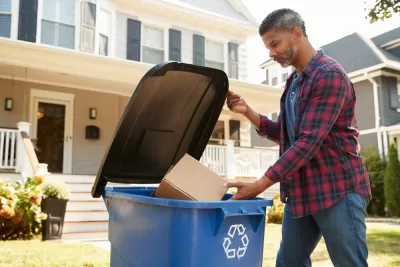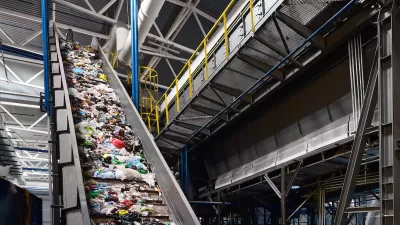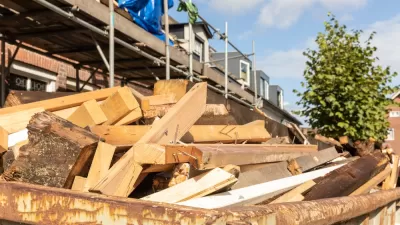In most residential areas across the United States, recycling is encouraged and offered as a way for residents to sustainably dispose of certain materials. But how many residents actually participate in their local recycling efforts?

In most residential areas across the United States, recycling is encouraged and offered as a way for residents to sustainably dispose of certain materials. But how many residents actually participate in their local recycling efforts?
As of 2018, the national recycling rate was just over 32 percent, which was less than the rate recorded in 2015. In cities, the numbers are becoming more concerning, specifically because China has stopped importing waste. Now, many cities have scaled back or completely eliminated their recycling efforts.
The one positive aspect to increased global restrictions on importing waste is that it exposes flaws in current recycling programs, giving cities a chance to improve their measures. Expanding access to recycling programs in urban areas is essential for various reasons. Learn more below.
Recycling’s Considerable Environmental and Cost Benefits
A city’s dense, populated spaces mean residents produce consistently large amounts of waste that require proper disposal. Seeking alternative measures to traditional waste removal techniques can help cities reduce their environmental impact and increase their cost savings. That’s where recycling comes in.
While recycling may not seem too beneficial on an individual level, it’s far and away a much more sustainable approach to waste removal than traditional methods. About 94 percent of the natural resources Americans use are non-renewable. Recycling saves non-renewable resources from landfills (like the 14 million used cell phones that end up in landfills annually) leading to increased energy savings.
Relatedly, recycling often leads to higher levels of cleanliness, crucial in urban areas. A more significant rate of recycling makes for cleaner air, tidier public areas, and cleaner waterways. This factor can drastically improve residents’ quality of life, especially when it comes to the promise of a more sustainable future.
When it comes to costs, the benefits are less obvious, but still present. In some cases, it can cost anywhere from $70 to $200 per ton to collect and dispose of waste. Well-managed recycling programs can cut that down to $50 to $150 per ton. When a properly run system is in place, cities can also limit how much they spend on managing landfills.
Though reduction and reuse approaches are more beneficial overall than recycling, it’s essential to note how prioritizing recycling in cities can bring many advantages.
How Urban Communities Can Achieve Recycling Accessibility
How can cities realize the many environmental and economic advantages of recycling? It’s all about accessibility. When recycling programs come with clear, easy-to-follow steps and are available for residents throughout the various boroughs and neighborhoods of a city, more people feel inclined to participate.
Arguably, the most effective way to increase access to recycling in a city is to offer curbside recycling pickup. In many cases, when recycling is left to the individual to gather, transport, and drop off, it becomes a significant and sometimes impossible task. This is especially true in urban locations. The landscape of a city is often incredibly diverse; residents have different incomes, housing conditions, and transportation methods. While it may be easy for one person to drive to a recycling center 30 minutes across the city, that option might not exist for someone who doesn’t have a car or has no time in their week to make that trek.
Therefore, coming to the resident is crucial. By offering that recycling pickup service alongside regular trash collection, residents will find it much easier to participate in their city’s recycling program. Providing adequate recycling bins for a small fee or free of charge also helps.
Overall, cities should make it a priority to consider all of the hurdles their residents face when it comes to recycling and other eco-friendly initiatives and work to address them.
Everyone Deserves an Accessible Way to Support the Planet
When cities offer the most convenient way feasible for their residents to partake in sustainable initiatives like recycling programs, they can expect to see increased participation numbers and will enjoy the environmental and cost benefits of such a program as well.

Alabama: Trump Terminates Settlements for Black Communities Harmed By Raw Sewage
Trump deemed the landmark civil rights agreement “illegal DEI and environmental justice policy.”

Planetizen Federal Action Tracker
A weekly monitor of how Trump’s orders and actions are impacting planners and planning in America.

The 120 Year Old Tiny Home Villages That Sheltered San Francisco’s Earthquake Refugees
More than a century ago, San Francisco mobilized to house thousands of residents displaced by the 1906 earthquake. Could their strategy offer a model for the present?

San Francisco Opens Park on Former Great Highway
The Sunset Dunes park’s grand opening attracted both fans and detractors.

Oregon Legislature to Consider Transit Funding Laws
One proposal would increase the state’s payroll tax by .08% to fund transit agencies and expand service.

Housing Vouchers as a Key Piece of Houston’s Housing Strategy
The Houston Housing Authority supports 19,000 households through the housing voucher program.
Urban Design for Planners 1: Software Tools
This six-course series explores essential urban design concepts using open source software and equips planners with the tools they need to participate fully in the urban design process.
Planning for Universal Design
Learn the tools for implementing Universal Design in planning regulations.
Clanton & Associates, Inc.
Jessamine County Fiscal Court
Institute for Housing and Urban Development Studies (IHS)
City of Grandview
Harvard GSD Executive Education
Toledo-Lucas County Plan Commissions
Salt Lake City
NYU Wagner Graduate School of Public Service






























